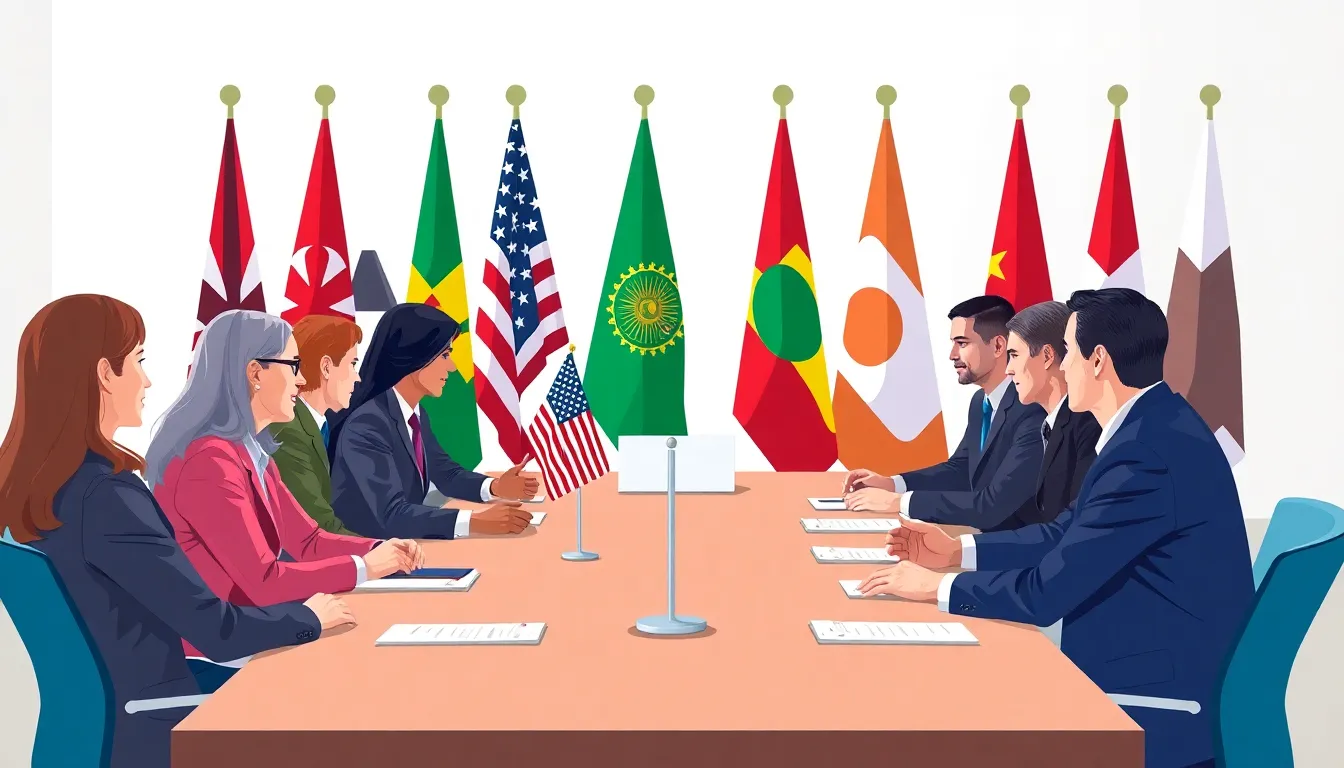In a world where news travels faster than a cat meme, global public affairs has never been more crucial. With issues like climate change, political unrest, and economic shifts dominating headlines, understanding the intricate dance of international relations is essential. It’s not just about what happens in your backyard; it’s about how those events ripple across the globe, affecting everything from trade to social justice.
Table of Contents
ToggleUnderstanding Global Public Affairs
Global public affairs encompasses the strategies and actions that address public interests on an international scale. Recognizing its significance becomes vital in navigating complex global issues.
Definition and Scope
Global public affairs refers to the management of relationships, communication, and engagement between organizations and global stakeholders. This area covers diverse topics such as international relations, diplomacy, and social responsibility. Organizations engage in public affairs to influence policy, shape public opinion, and build relationships with governments or international bodies. Effective public affairs campaigns often require an in-depth understanding of local cultures, regulations, and issues, as these aspects significantly impact global dynamics. This field is essential for businesses, governments, and non-profits since their operations increasingly depend on international engagement.
Importance in Today’s World
The relevance of global public affairs has grown in the context of interconnected economies and societies. Local events can trigger worldwide implications, making a strategic approach essential. Organizations that prioritize public affairs can effectively navigate crises, such as political unrest or environmental challenges. Communicating transparently on these issues fosters trust with stakeholders and enhances credibility. Furthermore, public affairs help drive social justice and sustainability initiatives on a global scale. As society faces compounded challenges, understanding and addressing these public affairs creates opportunities for positive change and collaboration across borders.
Key Players in Global Public Affairs

Key players in global public affairs include governments, international organizations, and non-governmental organizations (NGOs). Their actions significantly influence international relations and public policy.
Governments and International Organizations
Governments play a central role in shaping global public affairs. They develop policies and engage in negotiations that impact international relations. International organizations like the United Nations facilitate cooperation among nations. These bodies address global challenges such as security, health, and environmental issues. Their frameworks guide responses to crises and foster dialogue among member states. Multilateral agreements often evolve from discussions within these organizations, driving collaborative efforts toward solving complex problems.
Non-Governmental Organizations (NGOs)
NGOs contribute vital perspectives and resources to global public affairs. They advocate for human rights, environmental protection, and social justice initiatives. By raising awareness, these organizations mobilize public support and influence policy decisions. NGOs often partner with governments and international organizations to amplify their impact. Their on-the-ground efforts provide essential data and insights into local issues, ensuring global policies consider diverse community needs. Through campaigns and grassroots movements, NGOs forge connections among stakeholders, driving positive change across borders.
Major Trends in Global Public Affairs
Global public affairs is evolving rapidly, influenced by technological advancements and pressing global issues. Two major trends driving this evolution are digital communication strategies and sustainability initiatives.
Digital Communication Strategies
Digital communication plays a crucial role in global public affairs. Organizations leverage social media platforms to engage stakeholders in real-time conversations. They utilize analytics tools to track sentiment and measure public opinion, allowing for data-driven decisions. Moreover, targeted messaging through digital channels fosters inclusivity, ensuring diverse voices are heard. Crisis management increasingly relies on digital outreach, providing timely updates to mitigate misinformation. Multimedia content enhances storytelling, making messages resonate on a global scale.
Sustainability and Environmental Concerns
Sustainability stands at the forefront of global public affairs discussions. Increased awareness of climate change emphasizes the need for responsible practices across industries. Organizations adopt sustainable policies that align social responsibility with business objectives. Stakeholders expect transparency, pushing companies to disclose their environmental impact. Collaborative initiatives between governments and NGOs drive significant changes, creating frameworks for accountability. The focus on sustainable development goals promotes collective action that addresses ecological challenges across borders.
Challenges Facing Global Public Affairs
Global public affairs encounters numerous challenges that impact its effectiveness and reach. Political and economic barriers often obstruct the establishment of cooperative relationships among nations, while ethical considerations can complicate the communication strategies used to engage with stakeholders.
Political and Economic Barriers
Governments frequently impose regulations that hinder cross-border communications. Trade restrictions affect the ability of organizations to collaborate on international projects. Local political instability can disrupt effective public engagement, leaving communities without essential support. Economic disparities between countries often create a divide in resources and opportunities. Tensions among nations might also breed mistrust, complicating diplomatic efforts and strategic alliances. Successful global public affairs requires navigating these barriers through adaptable strategies and ongoing dialogue.
Ethical Considerations
Ethical challenges play a significant role in shaping global public affairs. Organizations face pressure to maintain transparency in their operations while fostering trust within communities. Conflicts of interest can arise when stakeholders’ needs vary, complicating decision-making processes. Commitment to social justice and human rights must guide public affairs strategies, as misalignment can jeopardize credibility. Moreover, organizations must navigate misinformation in a digital landscape, ensuring that their communications uphold integrity. Adopting ethical frameworks not only drives accountability but also enhances stakeholder engagement and collaboration.
Global public affairs is more than just a response to current events; it’s a proactive approach to shaping the future. As interconnectedness among nations continues to grow, the ability to navigate complex relationships and communicate effectively becomes essential. Organizations must prioritize collaboration and transparency to foster trust and drive meaningful change.
Addressing global challenges requires a collective effort from governments, NGOs, and businesses alike. By embracing innovative strategies and ethical practices, stakeholders can work together to tackle pressing issues such as climate change and social justice. The evolving landscape of global public affairs presents both challenges and opportunities, making it imperative for all players to stay informed and engaged.







